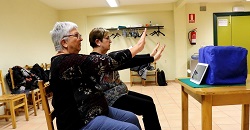Advance planning in dementia care and research practice
Dementia is a progressive and incurable condition that impacts one’s cognitive function and memory and can eventually result in death. “Due to concerns of losing autonomy and feelings of loss of purpose in life, dementia is a much-feared condition,” says Jenny van der Steen(opens in new window), a researcher at the Leiden University Medical Center(opens in new window). A key challenge in healthcare is to understand how to best optimise the quality of life and dying of persons with dementia, including from their own perspective. A good place to start is advance care planning (ACP). “ACP refers to the planning for future medical treatment and care,” explains van der Steen. “The concept has evolved to a focus on having conversations that explore values and preferences in a broad sense and discussing these with healthcare providers and loved ones and potentially but not necessarily formalising them in advance directives.” With the support of the EU-funded CONT-END project, van der Steen helped study the extent that two approaches to ACP (a medical approach and a less scripted psychosocial approach), technology at the end of life, and euthanasia, are acceptable interventions and can help persons with dementia retain a feeling of control over their lives. The European Research Council(opens in new window) supported project also conducted ethnographic work to understand the decision-making of researchers during end-of-life research. “This two-pronged approach allowed us to navigate those decisions that involve practical and ethical challenges in the practice of clinical research and to improve the quality of our research,” adds van der Steen.
Advance care planning and level of control
With a focus on six high-income countries, the researchers found that most people with dementia, their family caregivers and physicians see the general concept of ACP as acceptable. However, fewer found using technology to measure distress at the end of life acceptable and less saw euthanasia as a viable option. Researchers also found that people differed in how much control they felt the interventions provided. “While some people with dementia did feel in control of their lives, others didn’t,” notes van der Steen. “As to the latter, some would choose not to pursue interventions while others would rely on their family or physician to help.” Another key finding was that although the perspectives on the interventions were heavily influenced by the type of intervention, their acceptability did not vary much between persons with dementia, their family caregivers or physicians.
A less scripted, more psychosocial approach to advance care planning
As to how to best approach ACP, the project found that a less scripted, psychosocial approach was even slightly more acceptable than a medical one. Researchers also found that the level to which research protocols are scripted has a big impact on later decision-making. Specifically, over- and under-defined protocols necessitate decision-making later on, suggesting that there is a limit to the amount of effort one can put towards gaining control ahead of time. “In both dementia care and research practice, overcoming the limitations of protocols and checklists for future decision-making requires having conversations that elicit relevant personal values and decisions,” concludes van der Steen. The research team looks to expand on their work via additional research projects and through the Alzheimer Nederland(opens in new window) (website in Dutch) funded NEAR-END researchers network.





